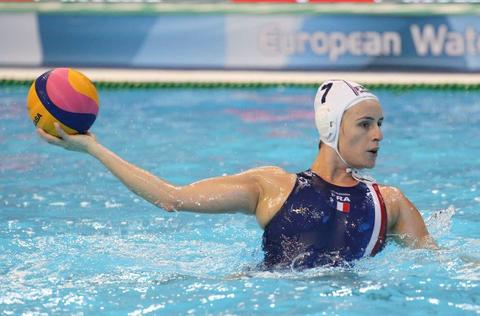
Marie Barbieux
Oceanographer and advanced water polo player
High-level sports has also allowed me to discover many facets of my personality and to work more effectively on my psychological weaknesses.
In Malaysia, this PhD in oceanography discovered water polo at the age of 12 thanks to a New Zealand player she met at the swimming pool where she spent most of her time. Four years later, back in France, she joined a club and became the only girl water polo player.
As a teenager, Marie spent two years on a sailing boat sailing around the Atlantic with her family. There she discovered the richness and beauty of the ocean.
"I was lucky enough to watch dolphins surfing on the bow of the boat, admire a sperm whale only a few meters away, cross the Atlantic in sometimes difficult weather conditions, and contemplate the stars in a perfectly dark sky," recalls Marie.
These images, forever engraved in her mind, pushed her to learn more about this still unknown space that is the ocean. After a degree in biology in Caen, this lover of the open sea specialized in oceanography at the University of Laval in Quebec before joining the Oceanography and Marine Environments Masters at Sorbonne University. At the same time, she participated in the Tara Mediterranean expedition to study the distribution of microplastics in a region particularly subject to anthropic pressure. Tara’s work is raising awareness among young and old alike of the actions that are essential to reducing our ecological footprint. She then joined the Villefranche-sur-mer marine station to complete her thesis.
Her research focuses on phytoplankton, the marine microalgae in the ocean that carry out photosynthesis and contribute half of the planet's primary oxygen production.
"Thanks to new robots, the BGC-Argo floats, for the first time we've managed to obtain measurements in all oceans with very high spatial and temporal resolution. My work consisted of analyzing this data from over a hundred floats to better understand the distribution and quantity of phytoplankton present in the ocean," she explains.
In 2015, Marie was selected for the French team, and continued her career as a high-level water polo player. She played as a 'number 1', a forward position that required stamina, physicality and technical astuteness. Combining competitions and a doctorate requires an iron discipline on a daily basis. Her days started at 6am with research work, then from 9am to 11am she went to the pool to train before continuing her research until late afternoon. At 6.30 pm, she did weight training and then another workout in the water until 10 pm. She also had to juggle between training weeks in Lille and research in Villefranche-sur-mer, not to mention gatherings with the French team.

En 2015, sélectionnée en équipe de France, Marie poursuit sa carrière de poloïste de haut niveau © Marie Barbieux
During this perilous journey through her PhD she could count on the support of her managers, friends and family, but also on that of Gaby Gorsky. The former director of the Villefranche-sur-Mer oceanography laboratory also had a career as a coach for the Nice men's water polo team.
"From the outset, Gaby encouraged me to pursue my dual project and supported me in all my endeavors," says Marie. He’s one of the many people who helped me with my plans, among others, Annick Bricaud and Julia Uitz, my thesis supervisors, and David Izidore, who was then responsible for high-level athletes at Sorbonne University."
After emerging unscathed from this grueling time, Marie is now proud to have gained her doctorate at the same time as representing her country in numerous international competitions. Being a high-level athlete has given her the opportunity to learn to surpass herself, perseverance, patience and the ability to invest herself within a team.
"High-level sports has also allowed me to discover many facets of my personality and to work more effectively on my psychological weaknesses. Without that experience, I probably wouldn't be the person I am today," she says.
Next year, the champion wishes to invest herself fully in her sporting project.
If I want a chance to represent France at this legendary competition, the Olympic Games, I must be totally committed.
The qualifying tournament for the 2020 Olympics will take place in March. Before that, she will have to be selected individually in order to participate in the European Championships in January 2020 and then in the qualifying tournament. The French women's water polo team will then need to be among the top ten nations in the world during these qualifications.
Passionate about oceanology, this top athlete doesn’t want to give up on science and hopes to return to research projects soon.
